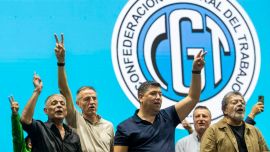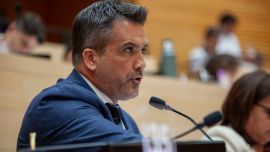Argentina is reporting over 7,000 coronavirus cases a day. The death toll is at just over 5,000 but growing daily. Latin America, full of structural problems, is being hit hard by the pandemic.
At press time, President Alberto Fernández was discussing extending the lockdown in the Buenos Aires metropolitan area (AMBA) again with City Mayor Horacio Rodríguez Larreta, a key member of the centre-right opposition and the provincial Governor Axel Kicillof, a progressive ally of the national government.
Fernández is not entirely satisfied with the situation. The president has even implied that he is willing to hit the “red button” and slap stricter quarantine rules back on if things get worse. Yet he has also quipped that the complaints about the lockdown are absurd, because effectively “everybody goes out” (even though his government has banned social gathering by decree).
It's difficult for a government to gain any kind of momentum during a pandemic. But Argentina's recent announcement on August 4 that it had reached a debt restructuring agreement with bondholders that had the right to sue the republic in US courts is giving the government, especially Economy Minister Martin Guzmán, something to work with. The next step is Argentina's pending payments to the International Monetary Fund (IMF), which injected US$44 billion dollars into the country during the mandate of centre-right president Mauricio Macri (2015-2019).
Guzmán has anticipated that the negotiations with the Fund, now under a new leadership, will take months. Dragging out the talks to reschedule payments could suit Argentina, with the US presidential elections, scheduled for November, looming. Some observers believe that the IMF's unprecedented massive loan to Macri was the work of US President Donald Trump's lobbying in favour of his old real-estate business chum. A Trump administration official all but acknowledged that in public recently.
The challenge for Guzmán is that negotiations with the IMF will involve discussions about Argentina's fiscal deficit. The Fund will want to know what Argentina plans to do about it. The minister does not want to show off that awkward card, at least not yet.
Guzmán has said recipes of extreme belt-tightening and austerity measures will not be accepted if that means subjecting the population to more misery. But the IMF will want to have some say about future policies if it is to reschedule payments. Guzmán's clout has increased since the agreement was announced on August 4. Still other economists, including Deputy Cabinet Chief Cecilia Todesca Bocco, are also floating economic policies. The government, after the debt deal, has the initiative. Juntos por el Cambio, the opposition coalition, is uncomfortable arguing about economic and debt matters given that Macri lost the elections last year in the middle of a recession.
So instead, the opposition is directing its criticism towards other matters. Lawmaker Mario Negri has accused the government of “falling in love” with the lockdown. He and others have also urged the president to scrap its bill to reform the justice system, claiming the move is designed specifically to spare Vice-President Cristina Fernández de Kirchner from corruption cases pending in court. The ruling left-leaning Peronist coalition controls the Senate, but the fight will be tighter in the lower house Chamber of Deputies, where Frente de Todos will need the backing of allies for the justice reform bill to be approved.
The ruling coalition is still yet to score a major victory in Congress. A wealth tax bill has not moved. The abortion bill has been postponed. The president also recently scrapped a bill to nationalise the debt-saddled soy crusher Vicentin, which was fiercely opposed by the farming sector and triggered angry street demonstrations.
What will happen to the agro-giant now that the state has pulled out? Sergio Nardelli, the firm’s 59 year-old boss, died of a massive heart attack on Wednesday night. Vicentin was a major contributor to Macri's campaign and during the Cambiemos leader’s presidency, state-run Banco Nación and others granted Nardelli huge loans that his company could not pay back due to the constant devaluation of the peso.
Macri's leadership of the centre-right opposition is now in doubt too. The former president recently flew to Paris with his family and will spend time in Europe, sparking criticism. Rodríguez Larreta, who has displayed bipartisan civility during the pandemic, tops public opinion polls. Yet Macri still has his hardcore supporters and the agitation will continue. Another anti-government protest has been called for August 17.
There are further signs, however, that the Fernandez administration is regaining the initiative. The president on Wednesday announced that Argentina and Mexico had signed an agreement with the UK-based pharmaceutical company AstraZeneca and the biotechnology company mAbxience (an arm of INSUD Pharma) to manufacture its Covid-19 vaccine for Latin America (except Brazil).
The agreement involves financing from the foundation of Mexican billionaire Carlos Slim. It includes the transfer of technology to initially produce 150 million doses of the vaccine, Reuters reported. The president said the agreement means that Argentina could have access to a low-cost vaccine as soon as it is ready, possibly early next year (Phase III studies and regulatory approvals are pending).
There is a lot of ideological arguing now raging about this deal. It is a story that is difficult to utter in one breath: a private British company that is developing a vaccine with Oxford University, two populist Latin American governments (Argentina and Mexico), an Argentine doctor who has amassed a fortune since establishing Insud Pharma with his wife in 1977 and a Mexican billionaire ready to bankroll the non-profit venture, potentially at a loss.
You try arguing with that.





















Comments